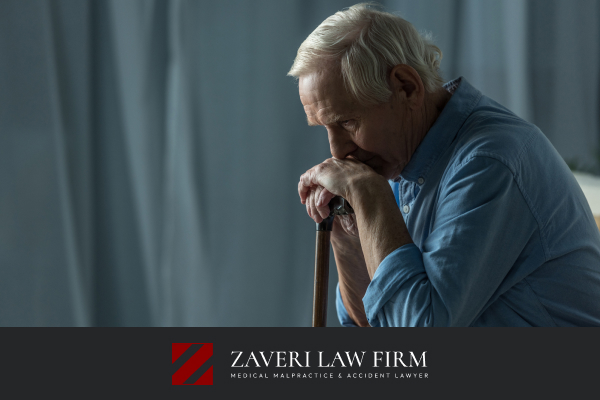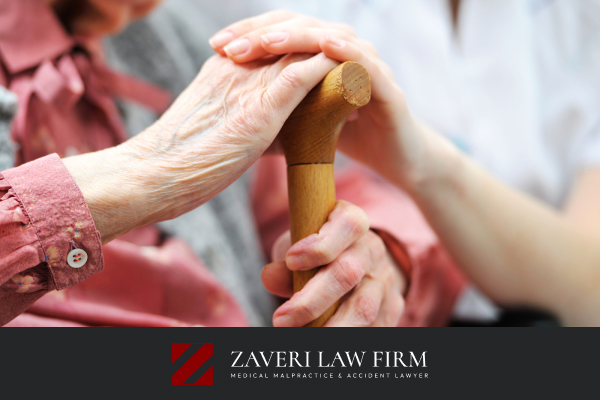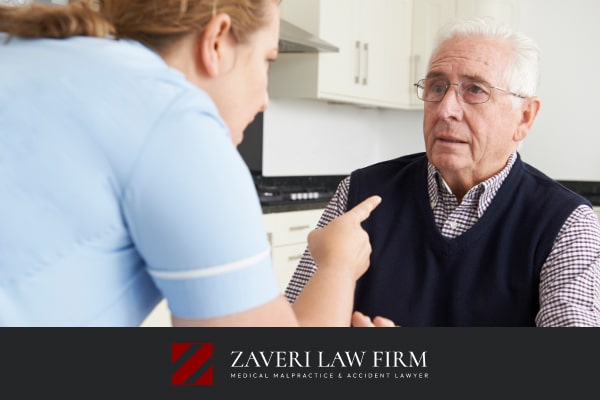
We trust our loved ones receive proper care in nursing homes. Yet, unfortunately, nursing home abuse can and does occur in Baltimore. Zaveri Law Firm is committed to helping victims and their families seek justice. Holding these institutions accountable is our foremost priority.
Nursing home abuse leaves a mark not just on the victim but on their families as well. Recognizing the signs and taking swift action can be necessary. At Zaveri Law Firm, we understand the sensitive nature of these cases. Nursing home neglect is a serious issue, and our Baltimore nursing home attorney can see if we can file an elder abuse lawsuit on your behalf. You do not need to report nursing home abuse on your own. We can advocate for your beloved nursing home resident.
Learn more about abuse in a nursing home facility below. Then, call us to schedule a free consultation with our Baltimore nursing home neglect attorney.

Experiencing or suspecting abuse in a nursing home is daunting. At Zaveri Law Firm, we investigate thoroughly, gathering pivotal evidence. Next, we guide clients through the intricacies of filing a lawsuit against the responsible parties. Our skilled lawyers also step up to the plate, negotiating with insurance companies to ensure rightful compensation.
If necessary, we're prepared to represent our clients in court, tirelessly advocating on their behalf. We aim to secure due compensation for all related damages.
Nursing home abuse is a tragic yet recurring problem affecting many seniors. It takes various forms, from physical harm to emotional torment. Beyond the immediate physical or emotional pain, the trauma can lead to long-term health complications and a diminished quality of life. Knowing and recognizing the signs is imperative, ensuring our loved ones remain protected.
Sadly, many residents suffer in silence, fearing retaliation if they speak out. By knowing what constitutes abuse, we can be proactive in prevention. Remember that sexual abuse of elderly residents in living facilities by nursing home employees can happen.

Nursing home abuse is not limited to physical harm; it can manifest in several ways. Recognizing the different types is the first step toward addressing the issue.
Physical abuse in nursing homes is an alarming reality. It includes actions like hitting, slapping, or physical injuries inflicted on a resident. Bruises, scratches, or unexplained injuries are often signs of such abuse. Residents may also become fearful of certain staff members, which can be a telling sign.
Emotional scars from physical abuse can last long after wounds have healed. The psychological trauma can lead to depression, anxiety, or other mental health issues. Victims might withdraw from social interactions or become unusually silent. It's important to take these signs seriously and act immediately.
Emotional abuse might not leave visible scars, but its effects can be profound. This includes actions like humiliation, threats, isolation, or verbal assaults. Victims often show signs of depression, fear, or changes in behavior. They might become more withdrawn or exhibit mood swings.
It's important to remember that emotional abuse can be as damaging as physical abuse. It can lead to long-term psychological issues and a decreased sense of self-worth. Creating open lines of communication with residents can help detect such abuse. Supporting the victim and ensuring their emotional well-being is essential.
Financial abuse in nursing homes can go unnoticed until huge damage is done. It involves unauthorized use of a resident's funds or assets, such as stealing money, forging signatures, or deceiving residents into signing documents. Regularly checking financial statements can help spot suspicious activities.
Recognizing financial abuse can be challenging, as perpetrators often go to great lengths to hide their actions. Maintaining open communication and frequently reviewing financial records can help spot irregularities. If discrepancies arise, delving deeper and seeking legal advice is essential.
Medical abuse encompasses any form of improper medical care. This includes overmedication, withholding necessary treatments, or not providing prescribed medicines. In some cases, it might involve unnecessary medical procedures. Monitoring medication and ensuring regular check-ups can help identify such issues.
Medical abuse can lead to a significant decline in a resident's health. Regularly reviewing medical records, asking about treatments, and being present during medical consultations can be helpful. If a resident shows sudden health deterioration without a clear cause, it might be worth investigating further.
Neglect is not uncommon in nursing homes. It includes failing to provide necessary care, like feeding, hydrating, or tending to hygiene. Bedsores, malnutrition, or unattended medical needs can be signs of neglect. Regular visits and actively engaging with care staff can help ensure proper care.
Neglect can result in serious health and emotional issues for the victim. It's essential to be vigilant and ensure the nursing home meets all care standards. If signs of neglect are evident, it's important to address them promptly and ensure that the resident receives the required care and attention.

Recognizing the signs of nursing home abuse can make all the difference. Early intervention can prevent further harm and ensure the safety of our loved ones.
Physical signs are often the most visible indicators of abuse. This includes unexplained bruises, cuts, or burns. Fractures or injuries that are inconsistent with given explanations should also raise alarms. Frequent infections or illnesses without a clear cause can also point to potential neglect or abuse.
Beyond these immediate indicators, sudden weight loss, dehydration, or malnutrition are telling signs. These can indicate neglect or intentional withholding of food and water. If a resident frequently appears disheveled or in dirty clothes, it might suggest a lack of proper care. All these signs warrant further investigation and immediate intervention.
Behavioral changes can offer insights into potential emotional or psychological abuse. If a resident suddenly becomes withdrawn, depressed, or anxious, it's a cause for concern. Fearfulness, especially around specific staff members, can also indicate ongoing abuse. Any unexplained or sudden change in behavior or mood should be addressed immediately.
Seeing a previously vibrant individual become quiet or fearful is heartbreaking. These shifts can indicate deeper underlying issues and should not be dismissed as mood swings. Engaging in regular conversations, being observant, and encouraging open communication can help identify the root cause.
Unexplained injuries are often clear indicators of abuse. If a resident has frequent injuries, especially if explanations are vague or inconsistent, it's a red flag. Repeated falls, fractures, or injuries in varying healing stages should raise suspicion. Always question the cause of injuries and, if unsatisfied with the answers, dig deeper.
It is vital to consistently seek a detailed account of the injury's cause and context. In many cases, perpetrators rely on the victim's inability or fear of communication. By being vigilant and ensuring the safety of our loved ones, we can prevent further harm.
Financial discrepancies can indicate ongoing financial abuse. Be alert if you notice unexplained withdrawals, missing assets, or sudden changes in financial documents. Regularly reviewing bank statements, financial transactions, and financial decision-making can help prevent such abuse.
Unfortunately, financial exploitation in nursing homes is not uncommon. But, being proactive, setting up checks and balances, and frequently communicating with the resident about financial matters can be preventive. If discrepancies arise, immediate action and seeking legal counsel can help rectify the situation.
If you suspect nursing home abuse, taking immediate action is essential. Start by documenting everything, ensuring you have a record of all suspicions. Then, prioritize the victim's well-being by seeking necessary medical attention. Gathering evidence and preserving any relevant records is needed to build a case.
A Baltimore nursing home abuse lawyer can provide legal guidance. Lastly, assist in any investigation, ensuring all evidence and testimonies are available.
Determining liability is pivotal in nursing home abuse cases. Factors like negligent hiring can make the facility directly responsible for abuse. Understaffing, leading to neglect, is another potential liability factor. Inadequate staff training can result in unintentional harm, making the facility liable. Furthermore, a breach of nursing home residents' rights is an apparent liability factor. Medication errors, either through negligence or intentional acts, are also grounds for liability. In addition, third-party abuse by visitors or other residents can lead to facility liability. They must have proper security measures aren't in place.
In Baltimore, victims have a specific time frame to file nursing home abuse claims, known as the statute of limitations. Generally, this period starts from the time the abuse was discovered. In Maryland, the statute of limitations is usually three years. But, there are exceptions and nuances to this rule. It's essential to consult with a lawyer immediately upon suspecting abuse to ensure timely legal action.

Victims of nursing home abuse or their families may seek various compensations. This includes medical expenses arising from the abuse. Pain and suffering, both physical and emotional, can also be compensated. Lastly, punitive damages might be awarded to deter future such behaviors. They are typically only granted in cases of extreme negligence or malicious intent.
Nursing home abuse can take multiple forms. They include physical harm, emotional or psychological mistreatment, financial exploitation, medical negligence, or general neglect. Familiarizing with the various signs is essential to ensure early detection and intervention.
If you or a loved one has experienced neglect or abuse in a nursing home, you have the right to file a lawsuit. Gathering evidence and consulting with a skilled nursing home abuse lawyer is essential. If you have concerns about nursing home negligence or Maryland nursing home abuse, we can help you. Schedule a consultation with our nursing home abuse attorneys today.

Nursing home abuse is a painful ordeal both for the victim and their families. At Zaveri Law Firm, we're committed to ensuring justice is served. By holding perpetrators accountable, we hope to prevent further abuse.
Don't remain silent if you or a loved one have suffered in a nursing home. Reach out to Zaveri Law Firm today. Our dedicated team is here to guide, support, and champion your rights every step of the way. Contact us today! Our nursing home abuse attorneys would be honored to help you.
Schedule Your
Free Consultation
Our Baltimore MD
Location
Phone: (240) 292-8374

